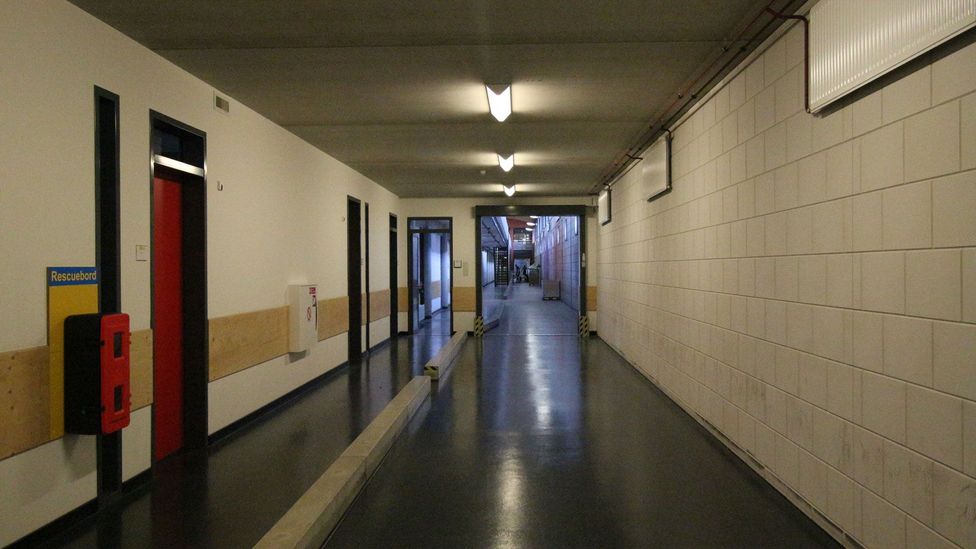The Best District Is Your House and a Prison
How prison changes people

Longer and harsher prison house sentences tin mean that prisoners' personalities will exist inverse in ways that make their reintegration difficult, finds Christian Jarrett.
Twenty-four hours after twenty-four hour period, year subsequently yr, imagine having no space to call your own, no choice over who to be with, what to eat, or where to become. There is threat and suspicion everywhere. Love or even a gentle homo touch can be difficult to find. You are separated from family unit and friends.
If they are to cope, so prisoners bars to this kind of surroundings have no option but to change and adapt. This is especially truthful for those facing long-term sentences – in England and Wales, around 43% of sentences now last more four years.
In a study on the psychological impact of imprisonment for the Usa government, the social psychologist Craig Haney (who collaborated with Philip Zimbardo on the infamous Stanford Prison Experiment) was frank: "few people are completely unchanged or unscathed by the [prison] experience".
You lot might also like:
• The prison problem that's frequently ignored
• Why the Dutch treat crime differently
• When personality goes from bad to practiced
Based on their interviews with hundreds of prisoners, researchers at the Establish of Criminology at the University of Cambridge went further, stating that long-term imprisonment "changes people to the core". Or in the stark words of a long-term inmate interviewed for enquiry published in the 1980s, afterwards years in prison "you ain't the same".

Reintegration into society can be difficult after a long prison sentence (Credit: Getty Images)
In the field of personality psychology, it used to be believed that our personalities remain largely stock-still in machismo. Simply contempo research has found that, in fact, despite relative stability our habits of thought, behaviour and emotion practise change in significant and consequential means – peculiarly in response to the different roles that we prefer as we go through life. It is nearly inevitable and then that time spent as a prisoner, in a highly structured yet socially threatening surroundings, is bound to lead to significant personality changes.
Peculiarly for anyone concerned near prisoner welfare and how to rehabilitate sometime convicts, the worry is that these personality changes, while they may assistance the prisoner survive their jail fourth dimension, are counter-productive for their lives upon release.
Key features of the prison environment that are likely to atomic number 82 to personality change include the chronic loss of free choice, lack of privacy, daily stigma, frequent fearfulness, need to clothing a constant mask of invulnerability and emotional flatness (to avoid exploitation past others), and the requirement, day after mean solar day, to follow externally imposed stringent rules and routines.
'Prisonisation'
There is surprisingly picayune inquiry on how these chronic features of the environs might change prisoners' personalities in terms of the "Large V" model of personality that dominates most modern research on the general, non-prison house population (based effectually the key traits similar extroversion and conscientiousness).

Prisoners arrange to their environs after long stints of jail time (Credit: Getty Images)
However, at that place is widespread recognition amongst psychologists and criminologists that prisoners adapt to their environment, which they phone call "prisonisation". This contributes towards a kind of "postal service-incarceration syndrome" when they are released.
Consider the findings from 'in-depth interviews with 25 former 'lifers' (including ii women) in Boston, who had served an average of xix years in jail. Analysing their narratives, psychologist Marieke Liema and criminologist Maarten Kunst found that the erstwhile prisoners had adult "institutionalised personality traits", including "distrusting others, difficulty engaging in relationships [and] hampered controlling".
One 42-year-old male person former prisoner said: "I practise [however] kind of act like I'm notwithstanding in prison, and I mean yous [are] not a light switch or a water faucet. You lot tin can't just turn something off. When y'all've done something for a certain corporeality of time… it becomes a function of yous."
The personality change that most dominated their accounts was an inability to trust others – a kind of perpetual paranoia. "Y'all cannot trust anybody in the joint," said some other of the interviewees, a man now aged 52. "I do take an issue with trust, I just do non trust anybody."
Interviews with hundreds of U.k. prisoners undertaken past Susie Hulley and her colleagues at the Institute of Criminology painted a similar flick. "Many… told u.s.a. that they had undergone significant and sometimes wholesale personal transformations," the researchers wrote in 2015.

Prison house can 'become role of you', one inmate said (Credit: Getty Images)
The prisoners described a process of "emotional numbing". "It does harden you. Information technology does make you a bit more distant," 1 said, explaining how people in jail deliberately conceal and suppress their emotions. "Information technology is who you become, and if you are hardened in the beginning so you become even harder, you go even colder, you become more detached." Another prisoner stated: "Information technology's... I, kind of, don't have feelings for people" any more.
In terms of the Big Five personality traits, ane could characterise this as a grade of farthermost low neuroticism (or high emotional stability or flatness), combined with low extraversion and low agreeability – in other words, not an ideal personality shift for the render to the outside world.
That is certainly the concern of Hulley and her colleagues. "As the long-term prisoner becomes 'adapted' – in the truthful sense of the term – to the imperatives of a sustained period of solitude, he or she becomes more emotionally detached, more self-isolating, more than socially withdrawn, and perhaps less well suited to life subsequently release," they warned.
The interview-based studies so far involved long-term prisoners incarcerated for many years. But an exploratory paper published in February 2022 used neuropsychological tests to show that even a short stay in prison had an impact on personality.
Criminal Myths
A special series about the factors that shape crime
The researchers led by Jesse Meijers at Vrije Universiteit Amsterdam tested 37 prisoners twice, iii months autonomously. At the second test, they showed increased impulsivity and poorer attentional control. These kinds of cerebral changes could indicate that their conscientiousness – a trait associated with self-discipline, orderliness and ambition – has deteriorated.

Prison time can issue in increased impulsiveness and poorer attentional control (Credit: Alamy)
The researchers think the changes they observed are probable due to the impoverished environment of the prison, including the lack of cerebral challenges and lost autonomy. "This is a significant and societally relevant finding," they concluded, "as released prisoners may be less capable of living a lawful life than they were prior to their imprisonment".
Even so, other findings offering some glimmers of promise. For another contempo paper – one of the few to apply the Large Five model to prisoner personality change – researchers compared the personality profiles of maximum security prisoners in Sweden with various control groups, including college students and prison guards. They found that while the prisoners scored lower on extroversion, openness, and agreeableness, as you might wait, they actually scored higher on conscientiousness, especially the 'sub-traits' of orderliness and self-discipline.
The researchers, led by Kristianstad University'southward Johanna Masche-No, don't believe this was due to a social desirability event – that the prisoners were trying to make a proficient impression on the team asking them questions – considering the results were confidential and the prisoners described themselves in unflattering terms on other traits like agreeability.
Instead, the researchers remember their findings may reflect a form of positive personality adjustment to the prison situation: "The environs in a prison is very strict with respect to both regulations and norms, and individual space is limited," they concluded. "Such an surround places demands on inmates to acquire order to avoid both formal punishment and negative acts from co-inmates."
In other words, it can help to exist conscientious to stay out of problem.

One group of Dutch prisoners showed improvements in their spatial planning abilities (Credit: Melissa Hogenboom)
Although these findings from Sweden seem to contradict the Dutch research, it'due south worth noting that while the Dutch prisoners became more impulsive and less attentive, they too showed improvements in their spatial planning abilities, which could exist seen as related to orderliness (Meijers and his colleagues did non read besides much into this improvement because they said it could but have been that the prisoners scored college on the test the 2d time circular because they'd had more practice at it). Another possibility is that the loftier conscientiousness seen in the Swedish prisoners is specific to their country'southward prison system, where there is a greater accent on treatment and rehabilitation than in many other countries.
Also hopeful, and somewhat in line with the Swedish findings, two recent studies involved prisoners playing fiscal games that are oft used to report cooperation, risk-taking and penalisation (one of the games is unrelatedly chosen The Prisoner's Dilemma). These showed that prisoners engaged in normal or even heightened levels of cooperation.
The findings take implications for debates about the reintegration of criminals into guild, says
Sigbjørn Birkeland at the NHH Norwegian School of Economic science, who conducted one of these studies with colleagues. "A common perception… is that criminals are bad guys who lack prosocial motivation and this perception may potentially be used to justify harsh sentencing of criminals," they wrote. Their results show, they said, that criminals can be but as "equally pro-socially motivated as the general population."
As sensation grows that personality is malleable, hopefully this will lead to greater efforts to consider how the prison house environment tin can shape an inmate's character. This clearly could bear on their return to lodge.

Prove suggests that the longer and harsher the prison sentence – the more likely that prisoners' personalities will be changed (Credit: Alamy)
At that place is currently a famine of existing research with this explicit aim. For now, the testify we have suggests that prison life leads to personality changes that are likely to hamper a person's rehabilitation and reintegration. To one extent that may be inevitable, given the loss of privacy and freedom.
But that said, the research findings regarding prisoner conscientiousness and cooperation evidence all hope is not lost, and they highlight potential targets for rehabilitation programmes.
These are not merely abstruse bug of business organisation to scholars: they have profound implications for how nosotros as a order wish to deal with those who pause our laws. The current testify suggests that the longer and harsher the prison sentence – in terms of less freedom, choice and opportunity for prophylactic, meaningful relationships – the more than likely that prisoners' personalities will be changed in ways that make their reintegration difficult and that increase their chance for re-offending.
Ultimately, guild may be confronted with a choice. We can punish offenders more severely and hazard irresolute them for the worse, or we can pattern sentencing rules and prisons in a mode that helps offenders rehabilitate and change for the better.
--
Dr Christian Jarrett edits the British Psychological Club's Research Digest blog. His next volume, Personology, volition be published in 2019.
Bring together 800,000+ Future fans past liking us on Facebook , or follow us on Twitter .
If y'all liked this story, sign upward for the weekly bbc.com features newsletter , chosen "If Y'all Only Read 6 Things This Week". A handpicked selection of stories from BBC Future, Culture, Capital, and Travel, delivered to your inbox every Fri.
Source: https://www.bbc.com/future/article/20180430-the-unexpected-ways-prison-time-changes-people
0 Response to "The Best District Is Your House and a Prison"
Enregistrer un commentaire